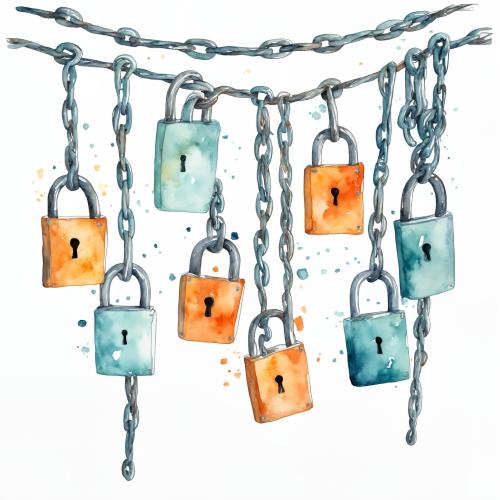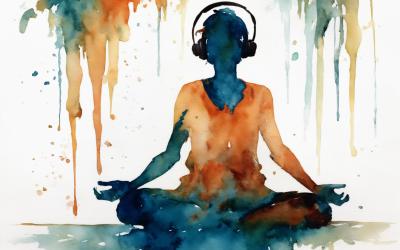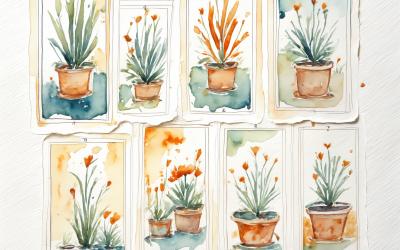Ever feel like you're reaching for your tarot deck a bit too often? Discover how to keep tarot as a helpful guide without letting it take control. Find out how to maintain a balanced approach and use your own wisdom alongside the cards.
Once we get proficient at reading the cards, sometimes we can get a little too attached to the wisdom from our trusted decks. Like a favourite jumper on a chilly day, we might find ourselves reaching for the cards a tad too often, wrapping ourselves in their comfort. But as with any powerful tool, there's a fine line between use and overreliance. Today, we're going to have a cosy chat about finding that sweet spot in our tarot practice.
The Siren Song of the Cards: Why We Get a Bit Too Attached
Now, why do we find ourselves shuffling and drawing cards more often than we change our socks? Well, it's not that hard to see why: In a world that's about as predictable as the British weather, tarot offers a reassuring pat on the back and a gentle nudge in the right direction. It's like having a wise old aunt in your pocket, always ready with some sage advice.
But here's the rub: this comforting presence can sometimes become a bit of a crutch. Before we know it, we're asking the cards whether we should have beans on toast or a cheese sarnie for lunch. This overreliance often stems from a niggling anxiety about the future or a lack of trust in our own good sense. You're using tarot as a GPS, but you're not even looking at the road - the cards are in the driving seat.
Signs You Might Be a Bit Too Fond of Your Cards
How can you tell if your relationship with tarot has gone from a lovely friendship to a bit of a codependent mess? Here are a few signs that might ring a bell:
- You can't decide between Earl Grey or English Breakfast (Americans, please feel free to insert similarly arbitrary coffee-based decision) without shuffling your deck first.
- Your cards are more worn out than a politician's promises.
- You're ignoring your mum's advice in favour of what you think the Seven of Cups is telling you about your love life.
- You're reading for yourself more often than you're checking your phone - and that's saying something.
- You're using tarot as an excuse to avoid actually dealing with your problems - it's like consulting a weather app instead of looking out the window.
If any of these sound familiar, it might be time for a little heart-to-heart with yourself.
Finding the Goldilocks Zone: Not Too Hot, Not Too Cold
A healthy relationship with tarot is like a good cuppa - it should enhance your day, not dominate it. Here are some thoughts on keeping things just right:
- Set specific times for readings. Treat it like a nice bit of 'me time', not a constant companion.
- Use tarot as a mirror for reflection, not a crystal ball. It's there to make you think, not to think for you.
- Blend tarot insights with good old-fashioned common sense and advice from people who actually know you.
- Trust your gut - sometimes you already know the answer, and you're just using the cards to avoid admitting it to yourself.
Actually Doing Something with Those Tarot Insights
It's not just about how often we're pestering our poor cards, but what we do with the wisdom they offer. Are we really listening, or are we just nodding along like we do when a colleague is telling us about their dream holiday?
Take a moment to mull over your readings. Jot down your thoughts. Most importantly, consider how you might actually put this guidance into practice. Tarot is at its best when it inspires us to get off our bums and do something, not when it's enabling us to stay stuck in our comfy armchairs of indecision.
What to Do When You're Not Reaching for the Cards
If you find your hand twitching towards your deck more often than you'd like, here are a few alternatives to consider:
- Journaling: Have a natter with yourself on paper. You might be surprised at what comes out.
- Meditation: Sit quietly and see what bubbles up. It's like listening to the radio of your mind.
- Talking to a mate: Sometimes a good chinwag over a pint can clear things up better than any spread.
Setting Some Ground Rules with Your Cards
Establishing a few personal rules for your tarot practice can help keep things tickety-boo. Maybe decide to limit readings to once a week, or only for questions bigger than "Should I watch another episode of Bake Off?"
Remember, the goal is to use tarot as a tool that gives you a leg up, not one that carries you around like a royal on a sedan chair. Trust in your own ability to muddle through life's challenges, with tarot as a friendly signpost rather than a bossy backseat driver.
When It's Time to Call in the Professionals
If you find that your reliance on tarot is mucking up your daily life, relationships, or peace of mind more than a bad hair day, it might be time to have a chat with a professional. A good therapist can help you sort out why you're leaning so heavily on the cards and give you some tools to stand on your own two feet.
Keep Calm and Tarot On (In Moderation)
Tarot, when used wisely, is like a good friend who tells you when you've got spinach in your teeth - honest, helpful, but not running your life for you. By finding a balance, we can enjoy the insights tarot offers without letting it call all the shots.
As you continue your journey with the cards, aim for a relationship that's more of a lovely addition to your life rather than the main course. After all, the most profound wisdom often comes from within - the cards are just there to give you a gentle prod in the right direction.
And remember, at the end of the day, you're the one holding the cards - both literally and figuratively. Use them wisely, and don't forget to enjoy the journey, bumps and all.






